PDS Organic Spices: Exporting to Canada - Detailed Report Analysis
VerifiedAdded on 2021/01/04
|7
|1336
|77
Report
AI Summary
This report examines the export process for PDS organic spices from India to Canada, focusing on key considerations for market entry and compliance. It details essential aspects such as shipping terms, including export and custom processes in both India and Canada, and the necessary documentation. The report also covers packaging and labeling requirements, emphasizing compliance with Canada's Consumer Packaging and Labelling Act. Furthermore, it analyzes the channel structure in both domestic and foreign markets, import licenses, and associated costs. Inventory turnover rates and perishability are also discussed, along with return and disposal practices, including potential disposal values. The report draws upon various sources, including industry publications and online resources, to provide a comprehensive overview of the export process.
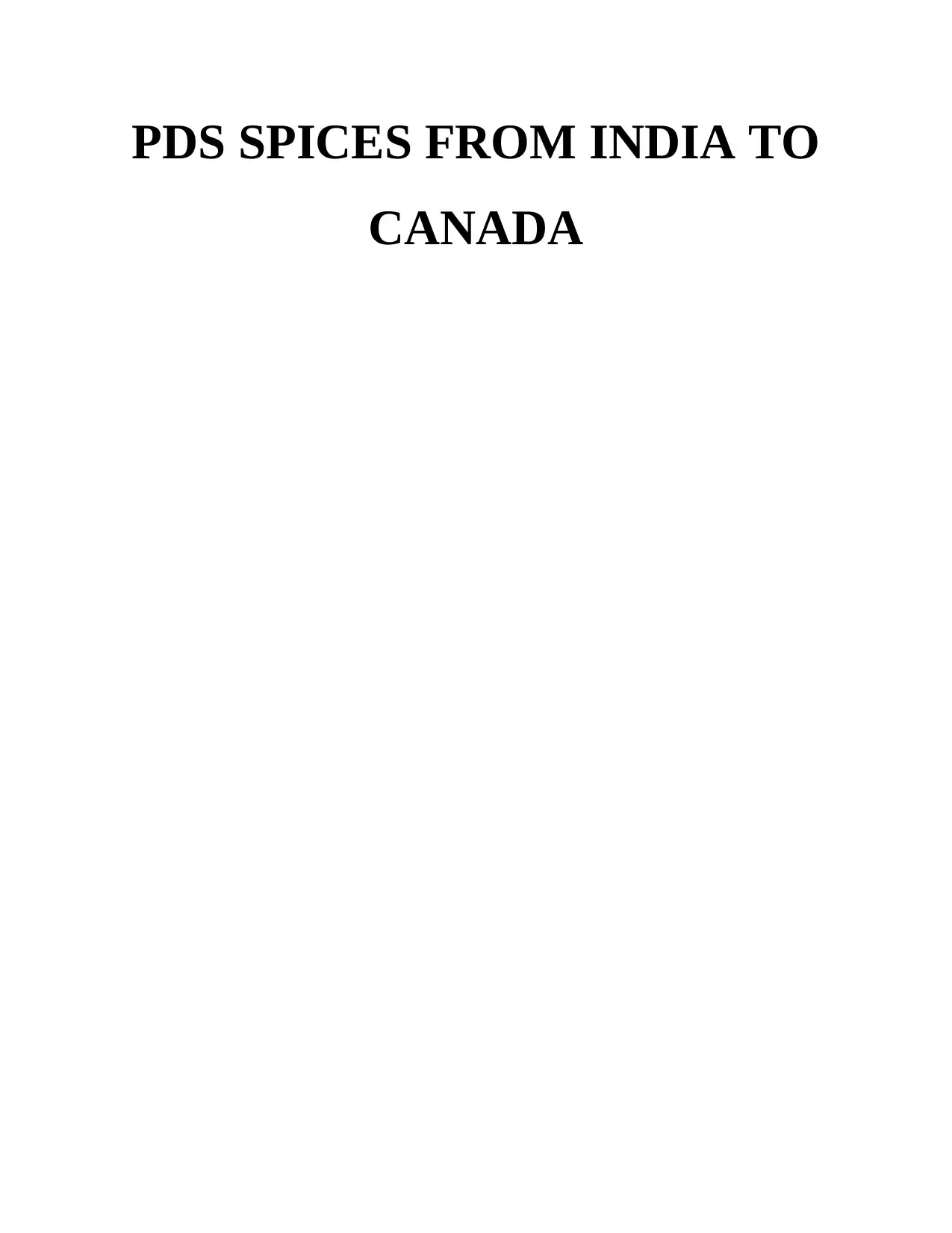
PDS SPICES FROM INDIA TO
CANADA
CANADA
Paraphrase This Document
Need a fresh take? Get an instant paraphrase of this document with our AI Paraphraser
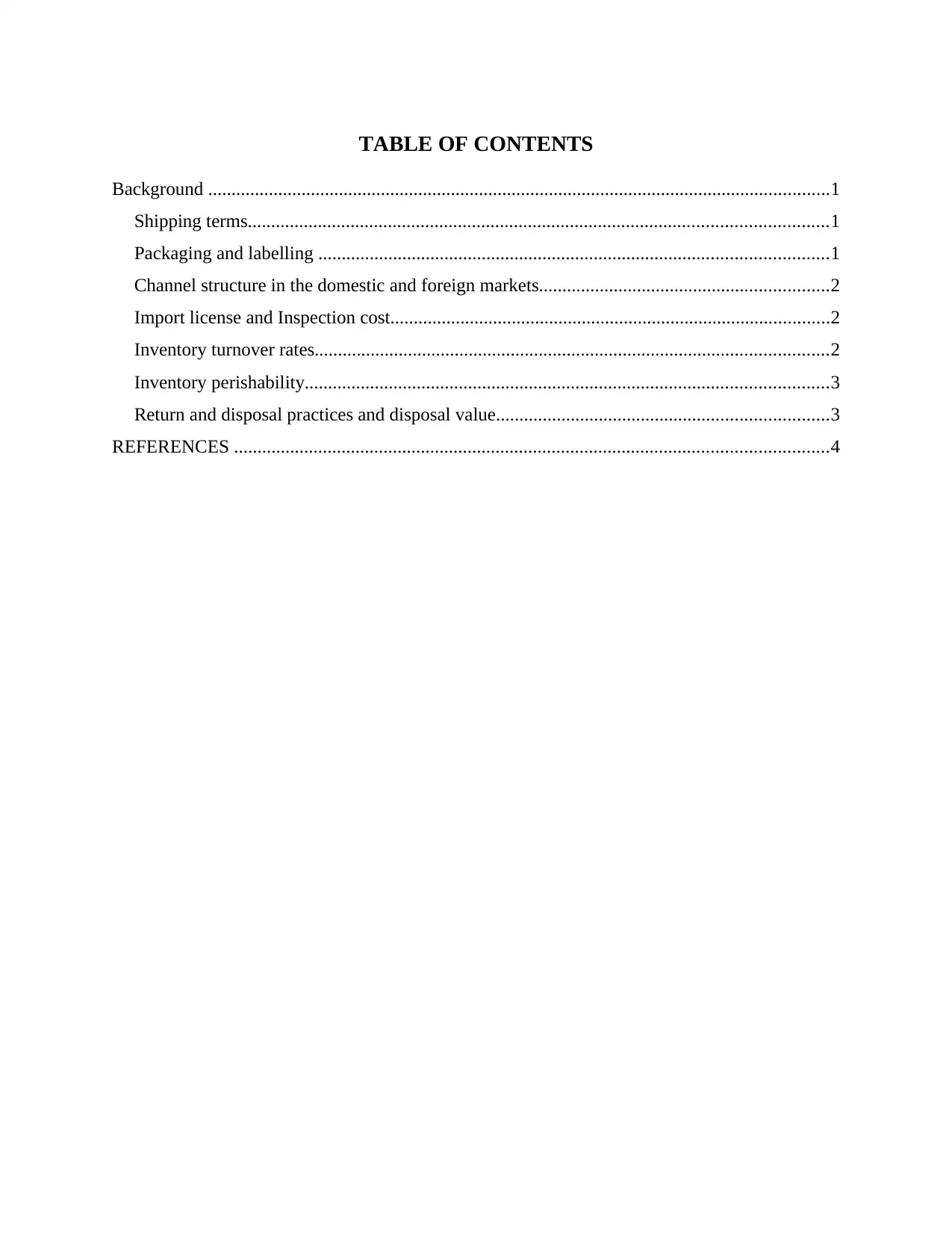
TABLE OF CONTENTS
Background .....................................................................................................................................1
Shipping terms............................................................................................................................1
Packaging and labelling .............................................................................................................1
Channel structure in the domestic and foreign markets..............................................................2
Import license and Inspection cost..............................................................................................2
Inventory turnover rates..............................................................................................................2
Inventory perishability................................................................................................................3
Return and disposal practices and disposal value.......................................................................3
REFERENCES ...............................................................................................................................4
Background .....................................................................................................................................1
Shipping terms............................................................................................................................1
Packaging and labelling .............................................................................................................1
Channel structure in the domestic and foreign markets..............................................................2
Import license and Inspection cost..............................................................................................2
Inventory turnover rates..............................................................................................................2
Inventory perishability................................................................................................................3
Return and disposal practices and disposal value.......................................................................3
REFERENCES ...............................................................................................................................4
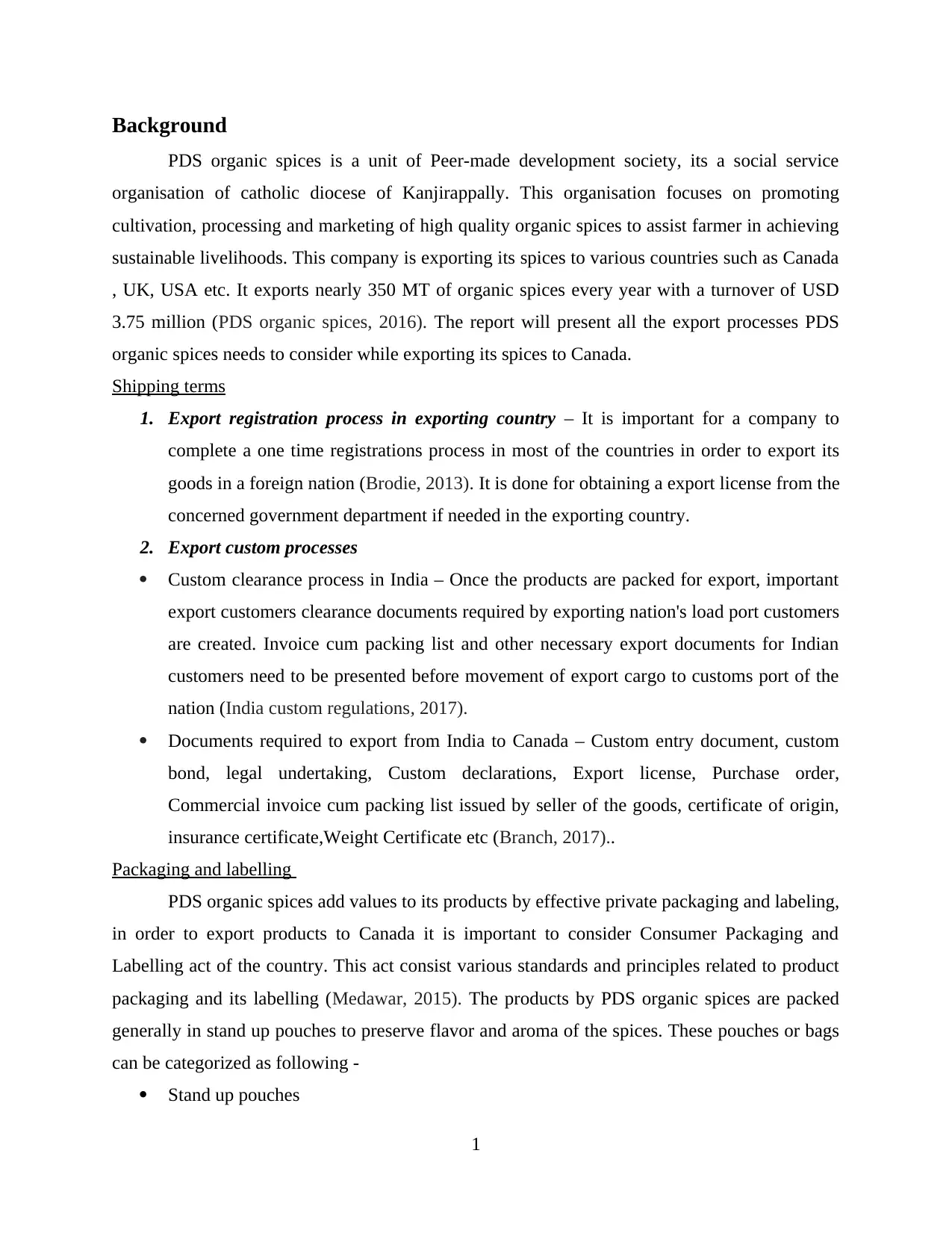
Background
PDS organic spices is a unit of Peer-made development society, its a social service
organisation of catholic diocese of Kanjirappally. This organisation focuses on promoting
cultivation, processing and marketing of high quality organic spices to assist farmer in achieving
sustainable livelihoods. This company is exporting its spices to various countries such as Canada
, UK, USA etc. It exports nearly 350 MT of organic spices every year with a turnover of USD
3.75 million (PDS organic spices, 2016). The report will present all the export processes PDS
organic spices needs to consider while exporting its spices to Canada.
Shipping terms
1. Export registration process in exporting country – It is important for a company to
complete a one time registrations process in most of the countries in order to export its
goods in a foreign nation (Brodie, 2013). It is done for obtaining a export license from the
concerned government department if needed in the exporting country.
2. Export custom processes
Custom clearance process in India – Once the products are packed for export, important
export customers clearance documents required by exporting nation's load port customers
are created. Invoice cum packing list and other necessary export documents for Indian
customers need to be presented before movement of export cargo to customs port of the
nation (India custom regulations, 2017).
Documents required to export from India to Canada – Custom entry document, custom
bond, legal undertaking, Custom declarations, Export license, Purchase order,
Commercial invoice cum packing list issued by seller of the goods, certificate of origin,
insurance certificate,Weight Certificate etc (Branch, 2017)..
Packaging and labelling
PDS organic spices add values to its products by effective private packaging and labeling,
in order to export products to Canada it is important to consider Consumer Packaging and
Labelling act of the country. This act consist various standards and principles related to product
packaging and its labelling (Medawar, 2015). The products by PDS organic spices are packed
generally in stand up pouches to preserve flavor and aroma of the spices. These pouches or bags
can be categorized as following -
Stand up pouches
1
PDS organic spices is a unit of Peer-made development society, its a social service
organisation of catholic diocese of Kanjirappally. This organisation focuses on promoting
cultivation, processing and marketing of high quality organic spices to assist farmer in achieving
sustainable livelihoods. This company is exporting its spices to various countries such as Canada
, UK, USA etc. It exports nearly 350 MT of organic spices every year with a turnover of USD
3.75 million (PDS organic spices, 2016). The report will present all the export processes PDS
organic spices needs to consider while exporting its spices to Canada.
Shipping terms
1. Export registration process in exporting country – It is important for a company to
complete a one time registrations process in most of the countries in order to export its
goods in a foreign nation (Brodie, 2013). It is done for obtaining a export license from the
concerned government department if needed in the exporting country.
2. Export custom processes
Custom clearance process in India – Once the products are packed for export, important
export customers clearance documents required by exporting nation's load port customers
are created. Invoice cum packing list and other necessary export documents for Indian
customers need to be presented before movement of export cargo to customs port of the
nation (India custom regulations, 2017).
Documents required to export from India to Canada – Custom entry document, custom
bond, legal undertaking, Custom declarations, Export license, Purchase order,
Commercial invoice cum packing list issued by seller of the goods, certificate of origin,
insurance certificate,Weight Certificate etc (Branch, 2017)..
Packaging and labelling
PDS organic spices add values to its products by effective private packaging and labeling,
in order to export products to Canada it is important to consider Consumer Packaging and
Labelling act of the country. This act consist various standards and principles related to product
packaging and its labelling (Medawar, 2015). The products by PDS organic spices are packed
generally in stand up pouches to preserve flavor and aroma of the spices. These pouches or bags
can be categorized as following -
Stand up pouches
1
⊘ This is a preview!⊘
Do you want full access?
Subscribe today to unlock all pages.

Trusted by 1+ million students worldwide
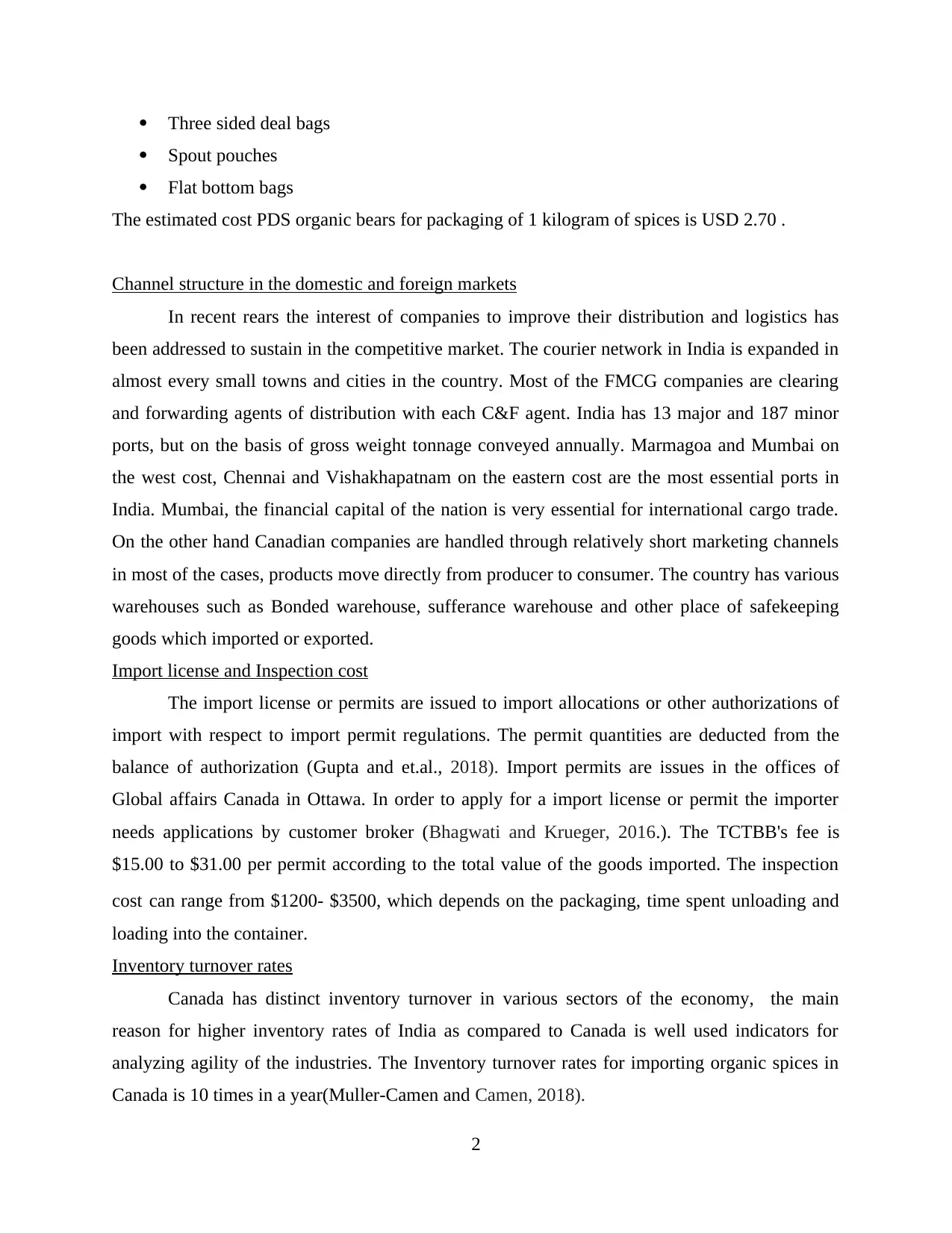
Three sided deal bags
Spout pouches
Flat bottom bags
The estimated cost PDS organic bears for packaging of 1 kilogram of spices is USD 2.70 .
Channel structure in the domestic and foreign markets
In recent rears the interest of companies to improve their distribution and logistics has
been addressed to sustain in the competitive market. The courier network in India is expanded in
almost every small towns and cities in the country. Most of the FMCG companies are clearing
and forwarding agents of distribution with each C&F agent. India has 13 major and 187 minor
ports, but on the basis of gross weight tonnage conveyed annually. Marmagoa and Mumbai on
the west cost, Chennai and Vishakhapatnam on the eastern cost are the most essential ports in
India. Mumbai, the financial capital of the nation is very essential for international cargo trade.
On the other hand Canadian companies are handled through relatively short marketing channels
in most of the cases, products move directly from producer to consumer. The country has various
warehouses such as Bonded warehouse, sufferance warehouse and other place of safekeeping
goods which imported or exported.
Import license and Inspection cost
The import license or permits are issued to import allocations or other authorizations of
import with respect to import permit regulations. The permit quantities are deducted from the
balance of authorization (Gupta and et.al., 2018). Import permits are issues in the offices of
Global affairs Canada in Ottawa. In order to apply for a import license or permit the importer
needs applications by customer broker (Bhagwati and Krueger, 2016.). The TCTBB's fee is
$15.00 to $31.00 per permit according to the total value of the goods imported. The inspection
cost can range from $1200- $3500, which depends on the packaging, time spent unloading and
loading into the container.
Inventory turnover rates
Canada has distinct inventory turnover in various sectors of the economy, the main
reason for higher inventory rates of India as compared to Canada is well used indicators for
analyzing agility of the industries. The Inventory turnover rates for importing organic spices in
Canada is 10 times in a year(Muller-Camen and Camen, 2018).
2
Spout pouches
Flat bottom bags
The estimated cost PDS organic bears for packaging of 1 kilogram of spices is USD 2.70 .
Channel structure in the domestic and foreign markets
In recent rears the interest of companies to improve their distribution and logistics has
been addressed to sustain in the competitive market. The courier network in India is expanded in
almost every small towns and cities in the country. Most of the FMCG companies are clearing
and forwarding agents of distribution with each C&F agent. India has 13 major and 187 minor
ports, but on the basis of gross weight tonnage conveyed annually. Marmagoa and Mumbai on
the west cost, Chennai and Vishakhapatnam on the eastern cost are the most essential ports in
India. Mumbai, the financial capital of the nation is very essential for international cargo trade.
On the other hand Canadian companies are handled through relatively short marketing channels
in most of the cases, products move directly from producer to consumer. The country has various
warehouses such as Bonded warehouse, sufferance warehouse and other place of safekeeping
goods which imported or exported.
Import license and Inspection cost
The import license or permits are issued to import allocations or other authorizations of
import with respect to import permit regulations. The permit quantities are deducted from the
balance of authorization (Gupta and et.al., 2018). Import permits are issues in the offices of
Global affairs Canada in Ottawa. In order to apply for a import license or permit the importer
needs applications by customer broker (Bhagwati and Krueger, 2016.). The TCTBB's fee is
$15.00 to $31.00 per permit according to the total value of the goods imported. The inspection
cost can range from $1200- $3500, which depends on the packaging, time spent unloading and
loading into the container.
Inventory turnover rates
Canada has distinct inventory turnover in various sectors of the economy, the main
reason for higher inventory rates of India as compared to Canada is well used indicators for
analyzing agility of the industries. The Inventory turnover rates for importing organic spices in
Canada is 10 times in a year(Muller-Camen and Camen, 2018).
2
Paraphrase This Document
Need a fresh take? Get an instant paraphrase of this document with our AI Paraphraser
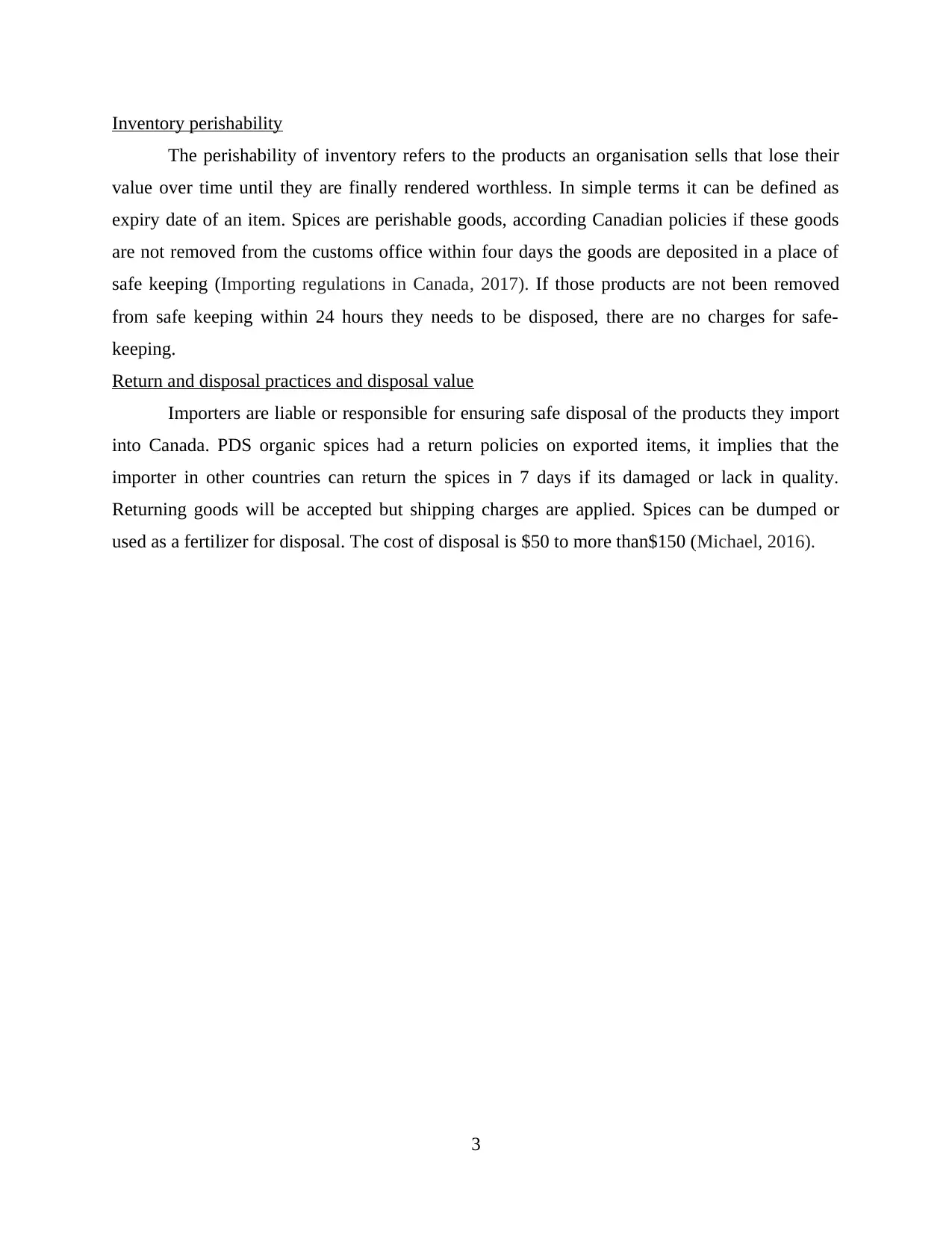
Inventory perishability
The perishability of inventory refers to the products an organisation sells that lose their
value over time until they are finally rendered worthless. In simple terms it can be defined as
expiry date of an item. Spices are perishable goods, according Canadian policies if these goods
are not removed from the customs office within four days the goods are deposited in a place of
safe keeping (Importing regulations in Canada, 2017). If those products are not been removed
from safe keeping within 24 hours they needs to be disposed, there are no charges for safe-
keeping.
Return and disposal practices and disposal value
Importers are liable or responsible for ensuring safe disposal of the products they import
into Canada. PDS organic spices had a return policies on exported items, it implies that the
importer in other countries can return the spices in 7 days if its damaged or lack in quality.
Returning goods will be accepted but shipping charges are applied. Spices can be dumped or
used as a fertilizer for disposal. The cost of disposal is $50 to more than$150 (Michael, 2016).
3
The perishability of inventory refers to the products an organisation sells that lose their
value over time until they are finally rendered worthless. In simple terms it can be defined as
expiry date of an item. Spices are perishable goods, according Canadian policies if these goods
are not removed from the customs office within four days the goods are deposited in a place of
safe keeping (Importing regulations in Canada, 2017). If those products are not been removed
from safe keeping within 24 hours they needs to be disposed, there are no charges for safe-
keeping.
Return and disposal practices and disposal value
Importers are liable or responsible for ensuring safe disposal of the products they import
into Canada. PDS organic spices had a return policies on exported items, it implies that the
importer in other countries can return the spices in 7 days if its damaged or lack in quality.
Returning goods will be accepted but shipping charges are applied. Spices can be dumped or
used as a fertilizer for disposal. The cost of disposal is $50 to more than$150 (Michael, 2016).
3
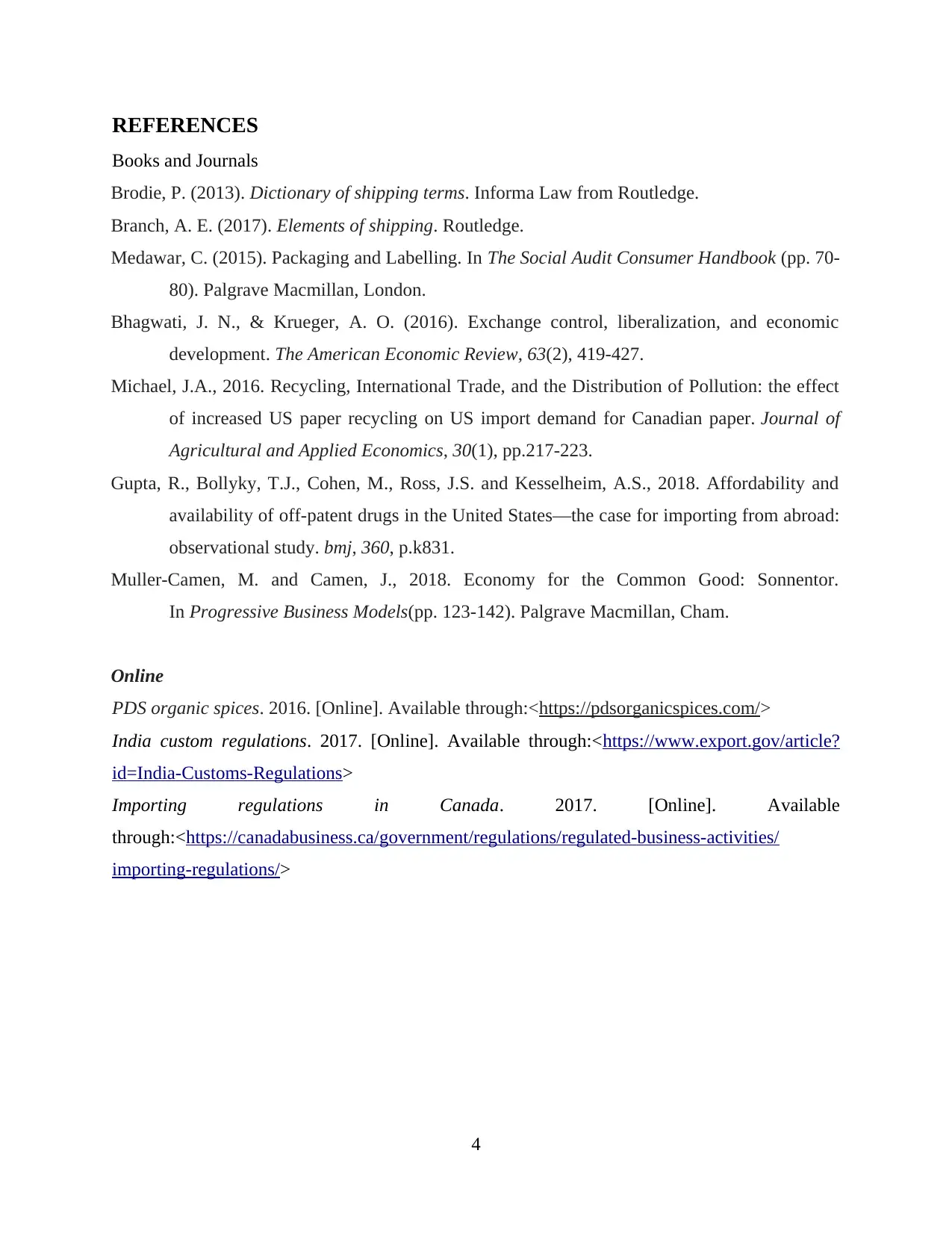
REFERENCES
Books and Journals
Brodie, P. (2013). Dictionary of shipping terms. Informa Law from Routledge.
Branch, A. E. (2017). Elements of shipping. Routledge.
Medawar, C. (2015). Packaging and Labelling. In The Social Audit Consumer Handbook (pp. 70-
80). Palgrave Macmillan, London.
Bhagwati, J. N., & Krueger, A. O. (2016). Exchange control, liberalization, and economic
development. The American Economic Review, 63(2), 419-427.
Michael, J.A., 2016. Recycling, International Trade, and the Distribution of Pollution: the effect
of increased US paper recycling on US import demand for Canadian paper. Journal of
Agricultural and Applied Economics, 30(1), pp.217-223.
Gupta, R., Bollyky, T.J., Cohen, M., Ross, J.S. and Kesselheim, A.S., 2018. Affordability and
availability of off-patent drugs in the United States—the case for importing from abroad:
observational study. bmj, 360, p.k831.
Muller-Camen, M. and Camen, J., 2018. Economy for the Common Good: Sonnentor.
In Progressive Business Models(pp. 123-142). Palgrave Macmillan, Cham.
Online
PDS organic spices. 2016. [Online]. Available through:<https://pdsorganicspices.com/>
India custom regulations. 2017. [Online]. Available through:<https://www.export.gov/article?
id=India-Customs-Regulations>
Importing regulations in Canada. 2017. [Online]. Available
through:<https://canadabusiness.ca/government/regulations/regulated-business-activities/
importing-regulations/>
4
Books and Journals
Brodie, P. (2013). Dictionary of shipping terms. Informa Law from Routledge.
Branch, A. E. (2017). Elements of shipping. Routledge.
Medawar, C. (2015). Packaging and Labelling. In The Social Audit Consumer Handbook (pp. 70-
80). Palgrave Macmillan, London.
Bhagwati, J. N., & Krueger, A. O. (2016). Exchange control, liberalization, and economic
development. The American Economic Review, 63(2), 419-427.
Michael, J.A., 2016. Recycling, International Trade, and the Distribution of Pollution: the effect
of increased US paper recycling on US import demand for Canadian paper. Journal of
Agricultural and Applied Economics, 30(1), pp.217-223.
Gupta, R., Bollyky, T.J., Cohen, M., Ross, J.S. and Kesselheim, A.S., 2018. Affordability and
availability of off-patent drugs in the United States—the case for importing from abroad:
observational study. bmj, 360, p.k831.
Muller-Camen, M. and Camen, J., 2018. Economy for the Common Good: Sonnentor.
In Progressive Business Models(pp. 123-142). Palgrave Macmillan, Cham.
Online
PDS organic spices. 2016. [Online]. Available through:<https://pdsorganicspices.com/>
India custom regulations. 2017. [Online]. Available through:<https://www.export.gov/article?
id=India-Customs-Regulations>
Importing regulations in Canada. 2017. [Online]. Available
through:<https://canadabusiness.ca/government/regulations/regulated-business-activities/
importing-regulations/>
4
⊘ This is a preview!⊘
Do you want full access?
Subscribe today to unlock all pages.

Trusted by 1+ million students worldwide

5
1 out of 7
Your All-in-One AI-Powered Toolkit for Academic Success.
+13062052269
info@desklib.com
Available 24*7 on WhatsApp / Email
![[object Object]](/_next/static/media/star-bottom.7253800d.svg)
Unlock your academic potential
Copyright © 2020–2026 A2Z Services. All Rights Reserved. Developed and managed by ZUCOL.


